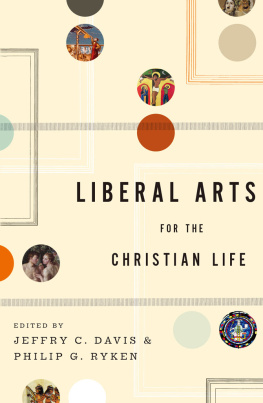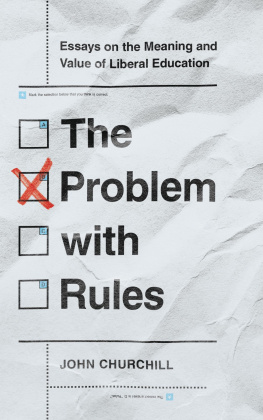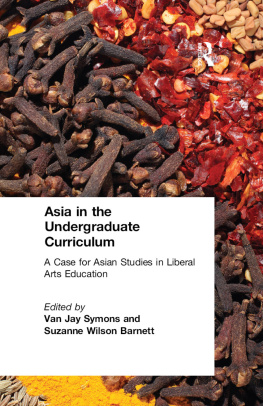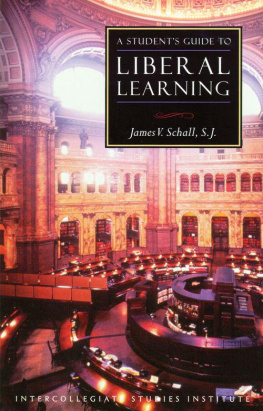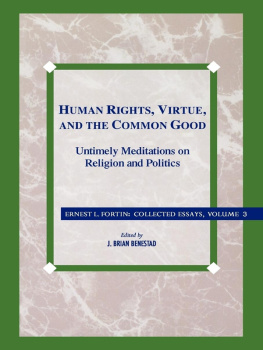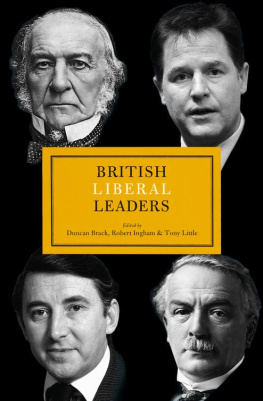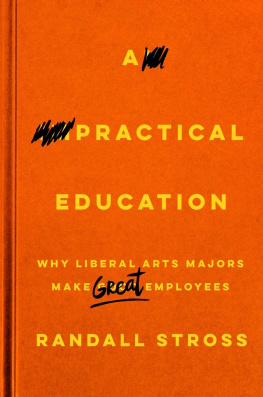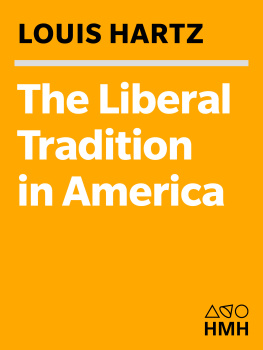Title page
The School of Freedom
A Liberal Education Reader from Plato to the Present Day
Edited and Introduced by
Anthony OHear and Marc Sidwell
imprint-academic.com
Copyright page
2013 digital version by Andrews UK Limited
www.andrewsuk.com
Copyright Anthony OHear and Marc Sidwell 2009
The moral rights of the editors have been asserted
No part of this publication may be reproduced in any form without permission, except for the quotation of brief passages in criticism and discussion.
Originally published in the UK by Imprint Academic
PO Box 200, Exeter EX5 5YX, UK
Originally published in the USA by Imprint Academic
Philosophy Documentation Center
PO Box 7147, Charlottesville, VA 22906-7147, USA
Where possible, material has been taken from the public domain. The editors are grateful to the following copyright-holders, whose material is used with permission.
Translations of extracts from St. Augustine of Hippos De Magistro and Retractationes , the works and letters of Alcuin, lfrics Grammar , St. Thomas Aquinass Qustiones Disputat De Veritate , John of Salisburys Metalogicon , Richard Paces De Fructu Qui Ex Doctrina Percipitur and the letters of St. Thomas More. All provided by Keith Sidwell (2008).
An Experiment in Adult Education by RH Tawney (1914). First published in The Political Quarterly , 2, May 1914. Reproduced with permission of Major General Charles Vyvyan as Executor of the RH Tawney Literary Estate. Letter by Sir Winston Churchill to Sir Vincent Tewson (11 March 1953). Reproduced with permission of Curtis Brown Ltd, London on behalf of the Estate of Winston Churchill.
A Place of Learning by Michael Oakeshott (1974). By permission of Timothy Fuller, Editor of the Colorado College Studies, where the lecture was first published in Colorado College Studies 12, 1975, and of the Right Honourable Oliver Letwin MP on behalf of the Michael Oakeshott Literary Estate.
Education, Value and the Sense of Awe by Anthony OHear (1992; reprinted 2004). By permission of the author.
The Seven Sleepers by Mark Van Doren (1944). Copyrighted by Charles and John Van Doren as Executors of the Estate of Mark Van Doren and Used with Permission.
Translation of Goethes Kennst du das Land? Provided by Anthony OHear (2009)
Dedication
Gilberto Highet, doctorum doctori
(1906-1978)
and to Dominique, always
Epigraph
The humanist wishes humanities to be taught, not as the history of superseded stages, but as the foundations of modern life.
Gilbert Highet
The desire for education, as a way of life rather than as a means of livelihood or a mere intellectual exercise, is instinctive among English people and ready to reveal itself, under favourable conditions, at any moment.
Albert Mansbridge
Disce ut doceas (Learn, that you may teach).
Alcuin of York
Quoted on the Columbia College website.
Opening line of the preface to University Tutorial Classes: a study in the development of higher education among working class men and women (1913), p. vii.
Sometimes claimed as the motto of the School of York; certainly an ideal Alcuin lived by, it is mentioned in his letters and was probably derived from the letters of St. Jerome.
Acknowledgements
This book has been several years in the journey from concept to publication. Thanks are due to all those who helped along the way, and to family and friends who were willing to hear of its progress and put up with its demands for so long. In particular, thank you to Ted Pappas and the Britannica blog for inviting us to join their Great Books forum, and also to both Michael Mosbacher and the Social Affairs Unit and Damian Thompson and the Catholic Herald for their early interest in the topic, and Thomas Aquinas College and Mark Henrie of the ISI for their assistance along the way. Elizabeth Sidwells educational work remains an inspiration.
Profuse thanks to Dr Martin Stephen, High Master of St Pauls School, for providing his own take on this great and under-debated topic in his foreword, which offers an interesting essay on liberal education and its fortunes in the UK in its own right. As well as demonstrating that after 500 years the legacy of John Colet works its magic still, the High Masters foreword underlines what also emerges from the range of other pieces we include in this anthology; that what we are calling liberal education can accommodate differences of policy and emphasis, but that what matters and what unites all those who are animated by its generosity of spirit, marking them off from the dismal utilitarians and social engineers who dominate these days, is just that: the spirit, which it is the aim of this anthology to embody.
We would also like to thank the University of Buckingham, and particularly Terence Kealey its Vice Chancellor for providing for one of us an academic environment congenial to what this book stands for, and also several cohorts of Education students there, with whom many of the passages included here have been discussed (probably the only university Education department in the country where this could be done without apology or embarrassment). As always on educational matters, Chris Woodhead has been best friend and staunchest critic, while we hope that Natasha, Jacob and Thea OHear still feel they have benefited from the spirit of a liberal education. Keith Sidwells translations were invaluable - and here, as elsewhere, all errors are inevitably our own. We are also enormously grateful to the Estates of RH Tawney, Sir Winston Churchill, Mark Van Doren and Michael Oakeshott for permission to reprint extracts from these authors. Very special thanks must go to Imprint Academic for taking the project on.
Finally, a book so wide in its scope, ranging across two and a half millennia, can never do more than scratch the surface of any period and risks trespassing across the deeper knowledge of countless specialists. All we can hope is that this overview provides a reminder of the traditional meaning of a liberal education, encouraging deeper study and understanding.
Foreword: The Strange Death of Liberal Education
Martin Stephen
(High Master, St Pauls School)
There is a basic problem with the concept of a liberal education, which is that for any state or parent-funded school pragmatism will be a bigger driver than liberalism. One definition of a liberal education is that it is an education that allows pupils to be exposed to the widest possible range of influences and opinions, seeking to develop the pupils own judgement on those issues rather than impose or preach an Establishment view. A liberal education allows choices. A liberal education seeks to inculcate an awareness not just of why a thing works, but that it can be beautiful in its working - a principle that applies to Maths as easily as English. A liberal education teaches passion for ones subject, a thirst for ideas rather than just facts, a hunger for food that feeds not just the mind but also the soul. A liberal education has time to gather flowers by the wayside. Unfortunately, this at times runs head-on into the basic need to educate children to earn a living and bang a hard core of basic skills in to them. A liberal education never ends, and the recipients carry on educating themselves long after any institution has had its way with them. Governments like boxes, with ticks in them. Like lacrosse, a liberal education is a game with no boundaries, but the urge of all but the most enlightened governments to slap border controls on at every opportunity condemns the two to a long-standing war.
Thomas Gradgrind used to symbolise the enemy of liberal education. The character in Charles Dickenss Hard Times famously wished to make education grindingly factual. In Gradgrinds world a horse was not a thing of beauty; it was a quadruped. The motivation behind such thinking in real as distinct from fictional society was the hard pragmatism of the Industrial Revolution. The huge wealth of the industrial revolution was not, with the exception of a very few cases, based on a liberal care for the individual and the cultivation of his or her imagination and finer sensibilities. Rather, it hinged for its success on cramming the maximum number of workers in to factories and back-to-back-housing that was a slum even as it was being built. The lasting irony of the Gradgrind approach was that it almost totally neglected science in favour of a concentration on the three Rs, with a disastrous and lasting effect on this countrys ability to produce or give credence to that most pragmatic of products, the engineer. That aside, the State educational system coming in to its own in the 1870s was pretty rough, tough and basic.
Next page

